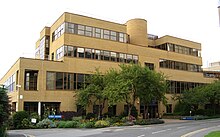This is an old revision of this page, as edited by Flawlessee (talk | contribs) at 10:26, 30 May 2016 (Somebody had added an irrelevant section on the 2016 GCSE Biology exam, I removed it.). The present address (URL) is a permanent link to this revision, which may differ significantly from the current revision.
Revision as of 10:26, 30 May 2016 by Flawlessee (talk | contribs) (Somebody had added an irrelevant section on the 2016 GCSE Biology exam, I removed it.)(diff) ← Previous revision | Latest revision (diff) | Newer revision → (diff)
| File:Assessment and Qualifications Alliance Logo.png | |
| Formation | 1997 (alliance) 2000 (merger) |
|---|---|
| Purpose | Examination board |
| Headquarters | Manchester and Guildford, United Kingdom |
| Region served | England, Wales and Northern Ireland |
| Chief Executive | Andrew Hall |
| Website | www.aqa.org.uk |
AQA (formally known as Assessment and Qualifications Alliance) is an awarding body in England, Wales and Northern Ireland. It compiles specifications and holds examinations in various subjects at GCSE, AS and A Level and offers vocational qualifications. AQA is a registered charity and independent of the government. However, its qualifications and exam syllabi are regulated by the Government of the United Kingdom, which is the regulator for the public examinations system in England and Wales.
AQA is one of five awarding bodies which are recognised by the regulators of the public exams systems for England, Wales and Northern Ireland to offer GCSE, AS and A Levels in the United Kingdom. AQA also offers the AQA Baccalaureate, a qualification also intended for students in Year 12 and 13. AQA is the largest examination board for GCSEs and GCE A Levels in England.

The organisation has several regional offices, the largest being in London, Guildford and Manchester. The current Chief Executive Officer of AQA is Andrew Hall.
Due to the growing number of students taking GCSE and A Level exams, AQA has introduced computerized and digital marking in addition to traditional marking of examinations in order to increase efficiency and accuracy of examination correction.
History
AQA was originally formed as an alliance of NEAB and AEB / SEG exam boards and City & Guilds vocational awarding body in 1997. In 2000, NEAB and AEB/SEG (but not City & Guilds) formally merged. City & Guilds continues to cooperate with AQA, and the AQA holds some candidate records for the City & Guilds. The AQA also holds the candidate records and awards for the following historic exam boards:
Incorporated examination boards
- Associated Examining Board (AEB) - Created: 1953
- Associated Lancashire Schools Examinations Board (ALSEB)
- Joint Matriculation Board (JMB)
- Northern Examining Association (NEA)
- Northern Examinations and Assessment Board (NEAB)
- North Regional Examinations Board (NREB)
- North West Regional Examinations Board (NWREB)
- North West Secondary Schools Examinations Board (NWSSEB)
- Southern Examining Group (SEG)
- South Eastern Regional Examinations (SEREB)
- Southern Universities’ Joint Board (SUJB) - Created 1954
- University of Bristol School Examinations Council (UBSEC)
- South West Regional Examinations Board (SWREB)
- Yorkshire Regional Examinations Board (YREB) - Created: 1979
- The West Yorkshire and Lindsey Regional Examinations Board (TWYLREB)
- Yorkshire and Humberside Regional Examinations Board (YHREB)
Examination reform
The Conservative Party under Prime Minister David Cameron initiated reforms for A Levels to change from the current modular to a linear structure. British examination boards (Edexcel, AQA, OCR and WJEC) regulated and accredited by the Government of the United Kingdom responded to the government's reform announcements by modifying syllabi of several A Level subjects. However, the Labour Party and in particular the Member of Parliament Tristram Hunt announced that it will halt and reverse the reforms and maintain the modular A-Level system. In addition, the Labour Party, Tristram Hunt and the modular AS- and A-Level system are supported and promoted by the University of Cambridge and by the University of Oxford.
The organisation announced that it will begin offering courses for which all assessment is carried out through examinations at the end of the course. This is commonly referred to as a linear course. Beforehand, they offered modular courses in England with several exams.
GCSE courses
Like its competitors AQA offers a substantial range of GCSE courses ranging from maths and English to sciences and foreign languages. Many of these courses offer both modular and linear assessment options. More recently due to government changes a linear approach is more common.
References
- "Andrew Hall". Retrieved 20 December 2015.
- AQA | About us
- "AQA – Overview of the AQA Baccalaureate". Aqa.org.uk. Archived from the original on 7 June 2009. Retrieved 8 December 2011.
{{cite web}}: Unknown parameter|deadurl=ignored (|url-status=suggested) (help) - Assessing candidates on future potential | Resource library | Talent Q
- AQA | Contact us | Contact us | Our offices
- How do examiners decide grades? | Schools Week
- [ARCHIVED CONTENT] Changes to A levels - The Department for Education
- Edexcel A levels | Pearson qualifications
- Labour pledges to halt A-Level reforms
- Cambridge urges schools to enter students for AS-levels - BBC News
- Oxford raises concerns over A-level exam reform - BBC News
- "BBC News - AQA exam board to bring in exam-only GCSEs in England". Bbc.co.uk. 27 September 2010. Retrieved 8 December 2011.
| British examination boards and assessment providers | |||||
|---|---|---|---|---|---|
| Secondary and higher |
| ||||
| Primary | |||||
| Notable historic boards | |||||
| Miscellaneous | |||||